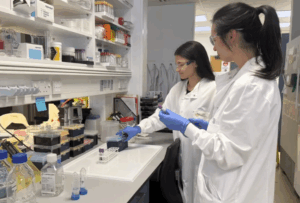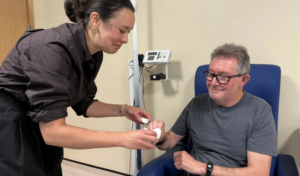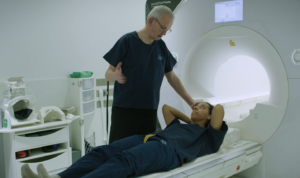An Oxford academic paper that suggests current sleep scoring criteria may lead to biased results between sexes and across age groups has been brought back into the spotlight with a recent editorial and podcast. A recent editorial by Prof Monika Haack of Harvard Medical School, published in the ... READ MORE
News for Preventive Neurology
UK charity renews funding for Oxford’s ground-breaking MND research
The Alan Davidson Foundation has renewed its commitment to motor neurone disease (MND) research in Oxford by supporting the ACORN study for a further three years. The Alan Davidson Foundation, which began funding ACORN in 2021, will continue to fund a full-time project manager to facilitate the ... READ MORE
First participant recruited to pioneering Parkinson’s trial
A pioneering clinical trial for people with a sleep disorder that puts them at higher risk of developing Parkinson’s has recruited its first UK participant. The trial involves 40 people with iRBD (idiopathic REM sleep behaviour disorder), recruited from the Discovery Cohort study at the ... READ MORE
Study finds no benefit of routine use of cerebral embolic protection devices on TAVI stroke risk
Using cerebral embolic protection devices during transcatheter aortic valve implantation (TAVI) procedures does not reduce a patient’s risk of experiencing a stroke, according to a large UK clinical trial led by researchers from the Radcliffe Department of Medicine (RDM) and Oxford University ... READ MORE
Wearable devices can help predict five-year risk of falls for people with Parkinson’s
University of Oxford researchers have demonstrated how clinicians could use data to predict the risk of falls in people with Parkinson’s disease (PD) to help improve effective longer-term care planning. Falls are a common problem for people living with Parkinson’s. A recent review estimated ... READ MORE
Lowering the barriers to participation in brain imaging research
Oxford BRC-supported researchers have produced videos aimed at increasing the diversity of participants taking part in brain imaging research studies. These ‘what to expect’ videos are part of a wider project by the BRC’s Imaging Theme and the University of Oxford’s Wellcome Centre for ... READ MORE
BLOG: How we’ve succeeded in recruiting older hospital patients onto our trial
Professor Sarah Pendlebury, from the NIHR Oxford BRC’s Preventive Neurology Theme, and Dr Aubretia McColl, of the Wolfson Centre for Prevention of Stroke and Dementia, explain how they have tackled the challenge of recruiting older, frail patients with multiple conditions to trials within ... READ MORE
Viagra drug improves brain blood flow and could help to prevent dementia
A University of Oxford trial has shown that sildenafil, commonly known as Viagra, enhances blood flow to the brain and improves the function of brain blood vessels in patients at a heightened risk of vascular dementia. This new study, published in Circulation Research and supported ... READ MORE
Blood test developed to identify those at risk of developing Parkinson’s
Research carried out at the University of Oxford has led to the development of a new blood-based test to identify the pathology that triggers Parkinson’s disease before the main symptoms occur. This could allow clinicians to screen for those individuals at high risk of developing the disease and ... READ MORE
New programme to move potential MND drugs into clinical trials faster
A ground-breaking experimental medicine programme that will enable researchers to more rapidly screen potential drugs in people with motor neurone disease (MND, also known as ALS), has been announced on Global MND Awareness Day. The EXPErimental medicine Route To Success, or EXPERTS-ALS programme ... READ MORE
New imaging centre performs first stroke thrombectomy
A new imaging centre at the John Radcliffe Hospital carried out its first stroke thrombectomy. The Acute Multidisciplinary and Interventional Centre (AMIIC) carried out the procedure on 17 May as part of its partnership with Oxford University Hospitals (OUH) NHS Foundation Trust. A ... READ MORE
Study shows need for greater screening for frailty in emergency hospital admissions
A new study has shown the need for more widespread screening for frailty in unplanned admissions to hospitals to better inform the care received by patients. Researchers at Oxford University Hospitals (OUH) NHS Foundation Trust, supported by the NIHR Oxford Biomedical Research Centre, carried ... READ MORE
One in eight people have undiagnosed nighttime hypertension
Around 15 percent of people aged between 40 and 75 may have a form of undiagnosed high blood pressure (hypertension) that occurs only at nighttime. Because they do not know about this, and are therefore not being treated for it, they are at a higher risk of cardiovascular disease such as ... READ MORE
BRC funds study to test anti-TNF drugs on post-operative delirium
University of Oxford researchers have been awarded a grant from the National Institute for Health and Care Research (NIHR) to investigate whether anti-tumour necrosis factor (TNF) therapy can reduce or prevent delirium following surgical operations. Post-operative delirium is an important ... READ MORE
Moderate drinking linked to brain changes and cognitive decline
Consumption of seven or more units of alcohol per week is associated with higher levels of iron in the brain, according to a study by Oxford researchers. Accumulation of iron in the brain has been linked with Alzheimer’s and Parkinson’s diseases and is a potential mechanism for alcohol-related ... READ MORE
Lymph nodes reveal more about mechanisms of autoimmunity
Two recent papers by Oxford researchers have shown that studying lymph nodes reveals details of the mechanisms of autoimmunity. Autoimmunity affects up to 10 per cent of people and includes conditions such as types of diabetes and thyroid diseases. More recently, a group of conditions has been ... READ MORE
Conference aims to forge collaborations to tackle dementia
Representatives of academia, the NHS, the non-profit sector and the healthcare industry have attended a conference in Oxford to explore how to tackle the current challenges in dementia research through improved collaboration. The aim of the 21st Century Translation Dementia Research conference, ... READ MORE
Unique Oxford study of vascular disease reaches 20th anniversary
The only project of its kind anywhere that studies patients with all types of acute vascular events - including strokes, heart attacks, aneurysms - in order to develop better diagnostic tests and treatments celebrates its 20th anniversary this month. The Oxford Vascular Study (OxVasc) ... READ MORE
Study finds no increased risk of rare neurological events after COVID vaccination
A study of more than eight million people has found no increased risk of rare neurological events after COVID -19 vaccination. However, the researchers did find a higher risk of Bell’s palsy (facial weakness), encephalomyelitis (inflammation of the brain and spinal cord) and Guillain-Barré ... READ MORE
First UK pilot study of newborn screening for spinal muscular atrophy launched
University of Oxford researchers have launched a pilot study to conduct routine testing of newborn babies for spinal muscular atrophy (SMA) for the first time. Every five days a baby is born in the UK with SMA. If treatments are delivered at birth, these newborns have the best chance of living ... READ MORE
- 1
- 2
- 3
- …
- 5
- Next Page »

















